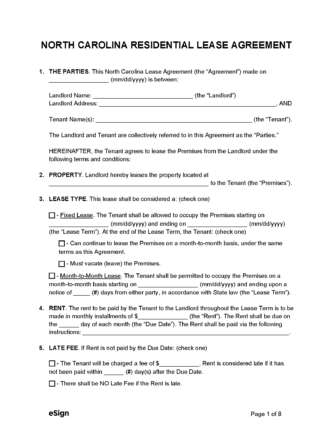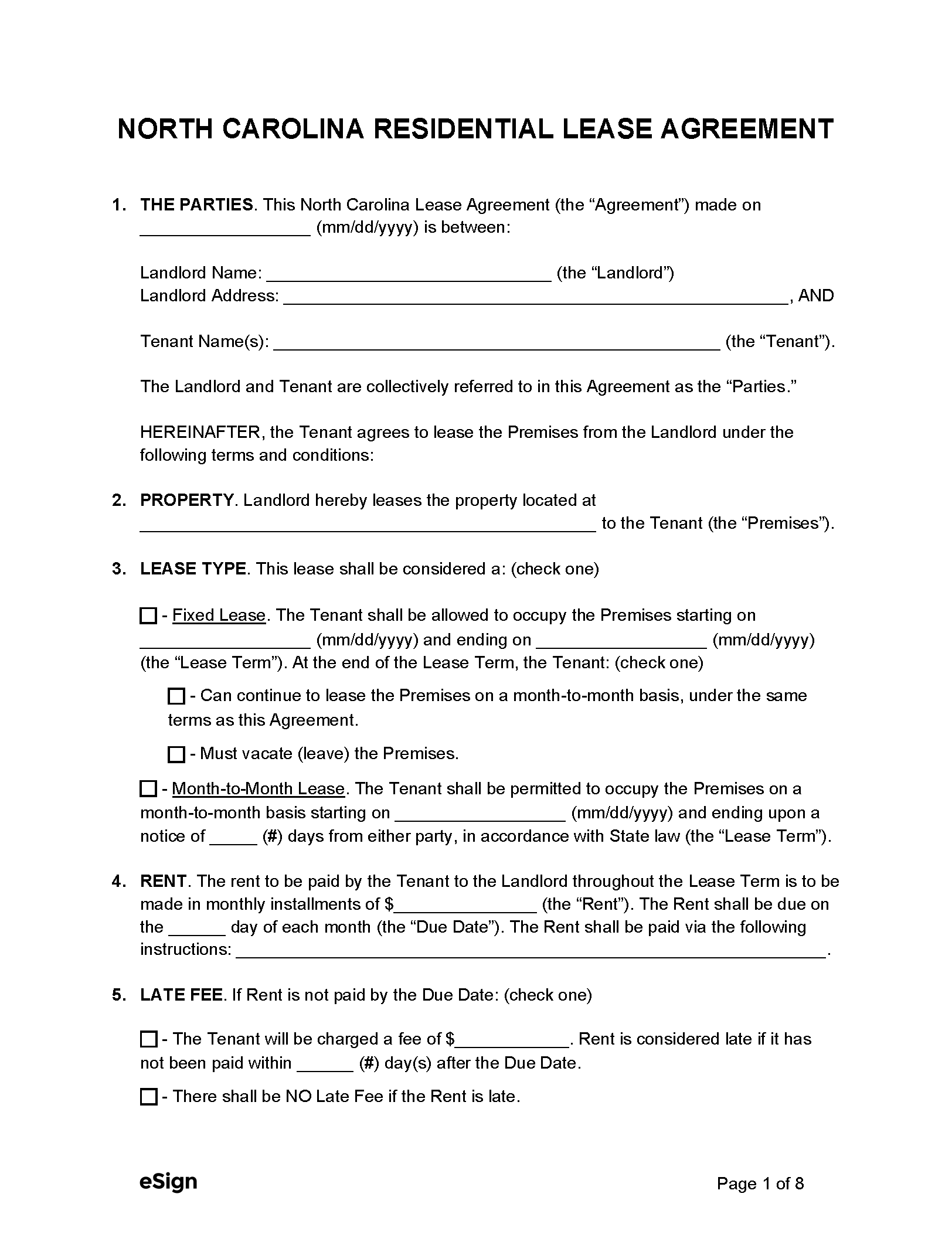
A North Carolina lease agreement defines the rights and responsibilities of a landlord and the tenant who will rent their rental property. The majority of leases have a one-year term, with rent paid on a monthly basis. Landlords can customize the agreement to suit their needs in terms of payment schedule, unit maintenance, and other rental conditions.
A North Carolina lease agreement defines the rights and responsibilities of a landlord and the tenant who will rent their rental property. The majority of leases have a one-year term, with rent paid on a monthly basis. Landlords can customize the agreement to suit their needs in terms of payment schedule, unit maintenance, and other rental conditions.
PDF Download
A North Carolina lease agreement defines the rights and responsibilities of a landlord and the tenant who will rent their rental property. The majority of leases have a one-year term, with rent paid on a monthly basis. Landlords can customize the agreement to suit their needs in terms of payment schedule, unit maintenance, and other rental conditions.
4.5 | 106 Ratings Downloads: 15,710
Maximum Amount ($) – Two months’ rent is the most that landlords can charge for security deposits on a standard lease. For month-to-month tenancies, one and a half months’ rent is the maximum amount. [3]
Collecting Interest – No state law requires a landlord to collect interest on the security deposit on behalf of the tenant.
Returning to Tenant – After the termination of their tenancy, security deposits must be given back to the tenant within 30 days. [4]
Itemized List Required? – Yes, the landlord must provide the tenant with a written list of any deductions from the security deposit. [5]
Separate Bank Account? – Yes, the landlord must keep the security deposit in a trust account or furnish a bond from a state-licensed insurance company. [6]
General Access – While not legally required, a landlord may choose to use a notice to enter to notify the tenant that they will enter the premises.
Immediate Access – There is no statute that prevents landlords from accessing their real estate whenever they please and without notice.
Grace Period – Five days must pass before the landlord can charge fees for unpaid rent. [7]
Maximum Fees ($) – The most that a landlord can charge tenants for late fees is $15 or 5% of the rent, whichever is greater. If rent is paid weekly, the maximum amount is $4 or 5% of the rent, whichever is greater. [8]
Back Check (NSF) Fee – Landlords may charge a $35 fee if a tenant’s check bounces. [9 ]
Withholding Rent – Tenants may not withhold rent in an attempt to force the landlord to make repairs. If the landlord fails to make the repairs requested by the tenant within a reasonable amount of time, the tenant may file a lawsuit. [10]
Non-Payment of Rent – If a tenant is late on their rent, the landlord may give them a 10-day notice to pay their rent or leave the property. [11]
Non-Compliance – North Carolina law does not specify any eviction notice requirements for tenants who breach the terms of their rental agreement. Landlords may furnish them with a notice to quit for violating their lease, demanding that they vacate the premises.
Tenant Maintenance – The landlord must inform the tenant in writing of any failure to maintain their rental unit. [12]
Lockouts – Tenants may only be forceably removed or excluded from the premises with a court order. [13]
Leaving Before the End Date – The landlord must make a reasonable effort to re-rent the property in order to mitigate damages if the tenant leaves prior to the end date of the agreement. [14]
Month-to-Month Tenancy – A 7-day notice to quit may be used by either a landlord or a tenant to terminate a month-to-month occupancy. [15]
Unclaimed Property – If the tenant abandons belongings that have a value of less than $750 and 10 days have elapsed since the tenant left, the landlord may deliver them to a nonprofit organization. [16] If the tenant is evicted and the property is valued at $500 or less, the landlord may dispose of the property after 5 days with a writ of possession. [17]